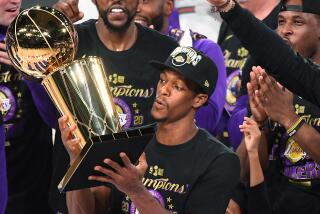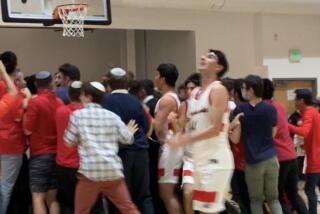Richardson Is Still Hoping for Another Comeback in NBA
- Share via
RAMAT GAN, Israel — No. 12 glides down the court, his eyes scanning the traffic of friendly and unfriendly players, his right hand pushing the ball forward effortlessly. He breaks right and a defender looms, but suddenly the ball is gone, shoveled left to a teammate for an easy layup.
It is just like the old days for Micheal Ray Richardson, the former New Jersey Nets playmaker. But appearances are deceiving. This is not the Meadowlands complex but a drafty, unkempt gym in a suburb of Tel Aviv, Israel’s largest city. And his teammates are not a promising collection of young veterans challenging for the NBA playoffs but a group of out-of-shape castaways dwelling in the cellar of Israel’s top pro basketball league.
For that matter, this isn’t the old Micheal Ray Richardson, a careless young man with a lot of energy and money to burn who had a penchant for expensive cars and fancy drugs. He is now 31 and says he knows he may be running out of time on the court as he pushes to get back to the National Basketball Assn., a league that has banished him for at least two years because of drug use.
For several years, Richardson made headlines because of silky playmaking and superb defense. He made more headlines because of his enduring love affair with cocaine, a love he couldn’t relinquish even when it threatened an abrupt end to his $750,000-a-year job. Last February, he became the first player to be banished under the NBA’s three-strikes-and-you’re-out drug rule.
Now, he wants to be the first to make it back. He says he has licked cocaine. He has said that before, but this time he has a series of urinalysis cards dating back six months to back him up. He came to Israel to play basketball, to make a little money and to keep his body sharp for a what he hopes will be a return to the NBA in January 1988.
Richardson came here under a contract that was to pay him less than one-tenth of what he made in New Jersey, only to find that the International Basketball Federation in Munich had decided that it, too, wanted nothing to do with him. The telegram arrived just a few hours before he was to make his debut here.
So now Richardson waits, working out with his teammates, attempting to inject into their play some of the intensity and arrogance that has always characterized his own, waiting for the president of the federation to reconsider, waiting ultimately for the NBA clock to expire.
“You know how you feel when you get your back to the wall and there’s just nowhere else to turn to? I feel that way now,” Richardson said in a recent interview. “When I was a kid, I just had the desire and wish to play in the NBA. I set goals and I worked hard, and now I’m at the stage where I want to work hard to do what I have to do to get back to where I was.”
Richardson agreed to be interviewed at his Tel Aviv hotel only reluctantly and with the stipulation that questions about his prior drug use not be on the agenda.
Occasionally, he would bury his head in a copy of the international edition of USA Today and mumble monosyllabic answers. But there also were moments when his brown eyes made contact, his slight stutter disappeared and the wall he has raised around his battered psyche temporarily came down.
“I brought all this on myself,” he said. “I wasn’t forced to take drugs; I chose to take drugs. I can’t blame anybody else. I can’t blame the NBA. I’ve got to blame me. And everybody says we all make mistakes, but unfortunately I just made a very big mistake.”
At first, it seemed as if Micheal Ray Richardson was fast enough to survive the fast life he adopted the minute he wound up his four years of eligibility at the University of Montana in 1978. Like the late Len Bias and dozens of other college stars, Richardson had no degree when he left school, only the prospect of big money in the NBA.
Even before he was drafted in the NBA’s first round by the New York Knicks, Richardson had gone through two agents and had a Datsun 280Z and a Pontiac Grand Prix in his garage on borrowed money. After the draft, he added a silver Rolls-Royce.
For a while, he had the statistics to back it all up--a two-time all-star pick who twice led the league in steals and made the NBA’s all-defensive team. But he soon had a serious cocaine habit, as well, one that gradually became more serious to him than the game he loved.
The Knicks traded him in November 1982 to Golden State after he disappeared from training camp and missed a team flight. Because Richardson’s fondness for drugs was still a secret, the Knicks were able to acquire Bernard King in exchange. The Warriors soon found out about their new property’s problem and three months later traded him to the Nets.
The next three years were up and down. At one point, Richardson admitted himself to a drug rehabilitation center and emerged to say at a news conference that he had licked his problem. Shortly afterward, however, he disappeared yet again from a training camp. He was the NBA’s comeback player of the year in 1984-85, but by last season he was again the disappearing man, and, this time, because of the NBA’s new drug rule, he was out.
Richardson went home to Mahwah, N.J., went to church for the first time in years and sought counseling and the help of friends, including a local Baptist preacher and the town’s police chief. There was a reconciliation with his estranged wife Leah and his two young children.
“When you take drugs, it shuts out everything else; your family, your profession. I wanted to deal with my wife and my kids as a father, not as a bum.”
Richardson turned down offers to play in Italy and in the Continental Basketball Assn. because, he says, the money and the level of competition were too low. He finally bit when Israel’s Hapoel Ramat Gan offered him a contract in the $60,000 range.
Ramat Gan had long dwelt in the cellar of Division One here. Its owners turned earlier this year to Avraham Hemmo, a former Israeli Olympic basketball player and retired police official. He arranged Richardson’s recruitment through an agent in New York.
Israelis take their basketball very seriously, and the competition is fierce. Each team is allowed two foreigners and each year also can add two new emigres, generally Jews who, under Israeli law, qualify automatically for citizenship when they step off the plane. Many teams play fast and loose with the rules.
Hemmo says that the word was soon out about Richardson and that his team’s competitors, fearing Richardson’s moves on the court and his reputation, did not want him around. When the international federation made its decision, there was some quiet rejoicing here.
“Some of us didn’t want Mr. Richardson to play in Israel because of his problems in the United States,” said Pinhas Goldstein, chairman of the sports committee of Israel’s Knesset.
Hemmo says he plans to appeal early next year and hopes Richardson will yet play for Ramat Gan. He fears too many setbacks will be a danger to Richardson. “We are very sorry for him and I am afraid for him,” said Hemmo. “He’s strong and he’s trying to help himself, but he needs help.”
But Richardson has stayed on, coaching his teammates, who started off the season 0-6 but have won two of three since Richardson began running their workouts.
He is the first one out on the concrete gym floor for practice and the one who leads wind sprints and other punishing drills. The team tends to play sharply in the first half, he says, then runs out of gas down the stretch, a sure sign the players are out of shape.
As for his own problems, only returning to the NBA will finally put them to rest. He adds that NBA Commissioner David Stern and other officials have given him encouragement and would like to see him make it back in January 1988, provided he remains drug-free.
It’s an optimistic scenario, but Richardson believes in it.
“I don’t want to take no shortcuts,” he said. “I want to do it the right way. I don’t want anybody to go and give me anything. I want to earn it.”
More to Read
All things Lakers, all the time.
Get all the Lakers news you need in Dan Woike's weekly newsletter.
You may occasionally receive promotional content from the Los Angeles Times.






